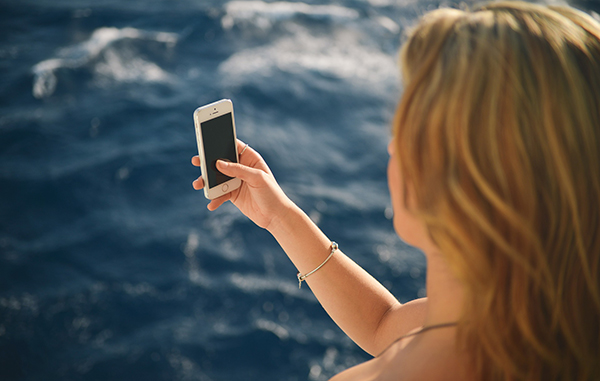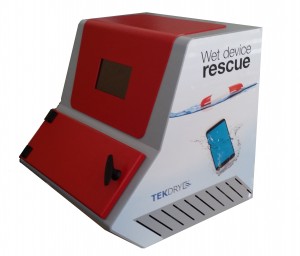The Denver-based inventors of a machine that revives wet cell phones are diving into reality TV and swimming into more Staples stores.
Adam Cookson and Craig Beinecke, co-founders of the startup TekDry, will appear on the ABC reality show “Shark Tank” at 8 p.m. on Friday. The episode airs just days after Staples announced 600 more of its stores will lease TekDry machines, which remove moisture from electronics by submerging them in a chamber filled with heated beads. The stations have been available in 82 Staples locations since last fall.
“The primary value for a business such as ours to be on “Shark Tank” is customer awareness,” said Cookson. “We have a service that solves a universal problem – everybody has a cell phone.”
In a pre-taped segment of ‘Shark Tank,’ Cookson and Beinecke pitched a panel of five venture capitalists in the hopes of hooking one as an investor in their company.
Since the episode hasn’t yet aired, Cookson cannot say whether the duo succeeded in getting a shark to bite. But he said that between the initial airing and reruns, the audience for the show is the equivalent to buying $6 million in advertising.
Cookson and Beinecke met co-founder Eric Jones while studying in the Daniels College of Business at University of Denver. The three graduated from the school’s part-time executive MBA program in spring 2013.
TekDry started raising money in 2014 to fund prototypes and patent applications for its machine as well as some product promotion, Cookson said. In SEC filings, the company has disclosed a pair of offerings, one that would be fully subscribed at $600,000 and one that would be capped at $1.5 million.
Today, Cookson said, TekDry machines have a 75 percent success rate for recovering devices treated within two days of getting wet.
Increasing your chances is simple, he added: “Don’t plug in a wet phone and get it to us as soon as possible.” Trying to dry a phone in rice doesn’t help either, Cookson said.
Newer versions of the TekDry machine can also report live usage data to TekDry headquarters in Colorado.
Cookson said a staff member of “Shark Tank” cold-called TekDry in January, just as the company saw its first major wave of sales.
“Since we launched back at the end of October last year, we’ve been growing (sales) at a rate of 22 percent per month,” Cookson said, up from $30,000 in sales for all of 2015. Cookson estimates that the company is on pace to break even by mid-2017.
In its expanded deal with Staples, TekDry will split revenue from repairs with the retailer and will also receive rent payments. Customers who bring a damaged device to Staples’ technology desk don’t pay a dime unless the device and all of its data are recovered: $40 for a flip phone, $70 for a smartphone or $100 for a laptop.
Besides Staples and other brick-and-mortar stores, customers can mail phones to TekDry in Colorado for $50, plus shipping. TekDry refunds customers if the recovery fails.
Cookson said the company has six full-time employees and is hiring more as it expands into more Staples stores through the middle of November.
But down the line, TekDry plans to use its technology to dry and sterilize products well beyond consumer electronics; medical devices, food technology and circuit boards are all possibilities.
“We will move forward with (medical applications) likely in the New Year,” Cookson said. “But we’re 100 percent focused on the Staples launch right now.”
The Denver-based inventors of a machine that revives wet cell phones are diving into reality TV and swimming into more Staples stores.
Adam Cookson and Craig Beinecke, co-founders of the startup TekDry, will appear on the ABC reality show “Shark Tank” at 8 p.m. on Friday. The episode airs just days after Staples announced 600 more of its stores will lease TekDry machines, which remove moisture from electronics by submerging them in a chamber filled with heated beads. The stations have been available in 82 Staples locations since last fall.
“The primary value for a business such as ours to be on “Shark Tank” is customer awareness,” said Cookson. “We have a service that solves a universal problem – everybody has a cell phone.”
In a pre-taped segment of ‘Shark Tank,’ Cookson and Beinecke pitched a panel of five venture capitalists in the hopes of hooking one as an investor in their company.
Since the episode hasn’t yet aired, Cookson cannot say whether the duo succeeded in getting a shark to bite. But he said that between the initial airing and reruns, the audience for the show is the equivalent to buying $6 million in advertising.
Cookson and Beinecke met co-founder Eric Jones while studying in the Daniels College of Business at University of Denver. The three graduated from the school’s part-time executive MBA program in spring 2013.
TekDry started raising money in 2014 to fund prototypes and patent applications for its machine as well as some product promotion, Cookson said. In SEC filings, the company has disclosed a pair of offerings, one that would be fully subscribed at $600,000 and one that would be capped at $1.5 million.
Today, Cookson said, TekDry machines have a 75 percent success rate for recovering devices treated within two days of getting wet.
Increasing your chances is simple, he added: “Don’t plug in a wet phone and get it to us as soon as possible.” Trying to dry a phone in rice doesn’t help either, Cookson said.
Newer versions of the TekDry machine can also report live usage data to TekDry headquarters in Colorado.
Cookson said a staff member of “Shark Tank” cold-called TekDry in January, just as the company saw its first major wave of sales.
“Since we launched back at the end of October last year, we’ve been growing (sales) at a rate of 22 percent per month,” Cookson said, up from $30,000 in sales for all of 2015. Cookson estimates that the company is on pace to break even by mid-2017.
In its expanded deal with Staples, TekDry will split revenue from repairs with the retailer and will also receive rent payments. Customers who bring a damaged device to Staples’ technology desk don’t pay a dime unless the device and all of its data are recovered: $40 for a flip phone, $70 for a smartphone or $100 for a laptop.
Besides Staples and other brick-and-mortar stores, customers can mail phones to TekDry in Colorado for $50, plus shipping. TekDry refunds customers if the recovery fails.
Cookson said the company has six full-time employees and is hiring more as it expands into more Staples stores through the middle of November.
But down the line, TekDry plans to use its technology to dry and sterilize products well beyond consumer electronics; medical devices, food technology and circuit boards are all possibilities.
“We will move forward with (medical applications) likely in the New Year,” Cookson said. “But we’re 100 percent focused on the Staples launch right now.”



Leave a Reply